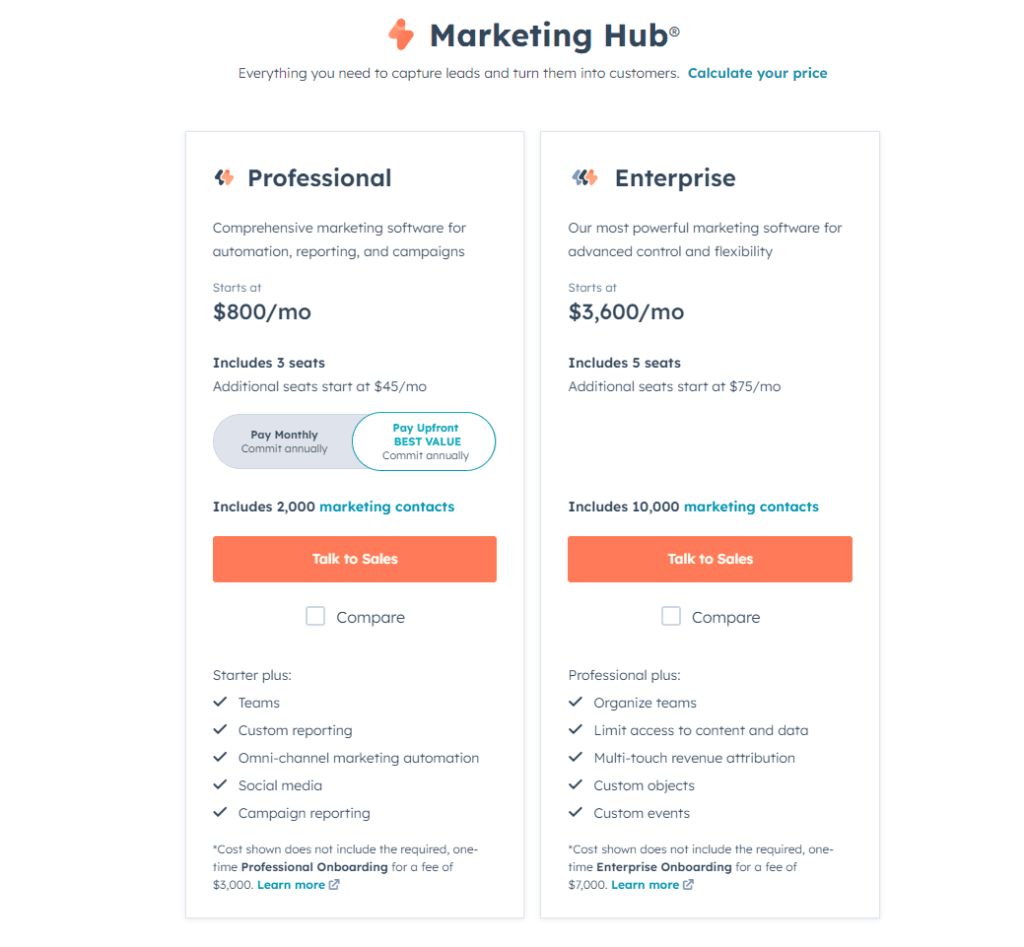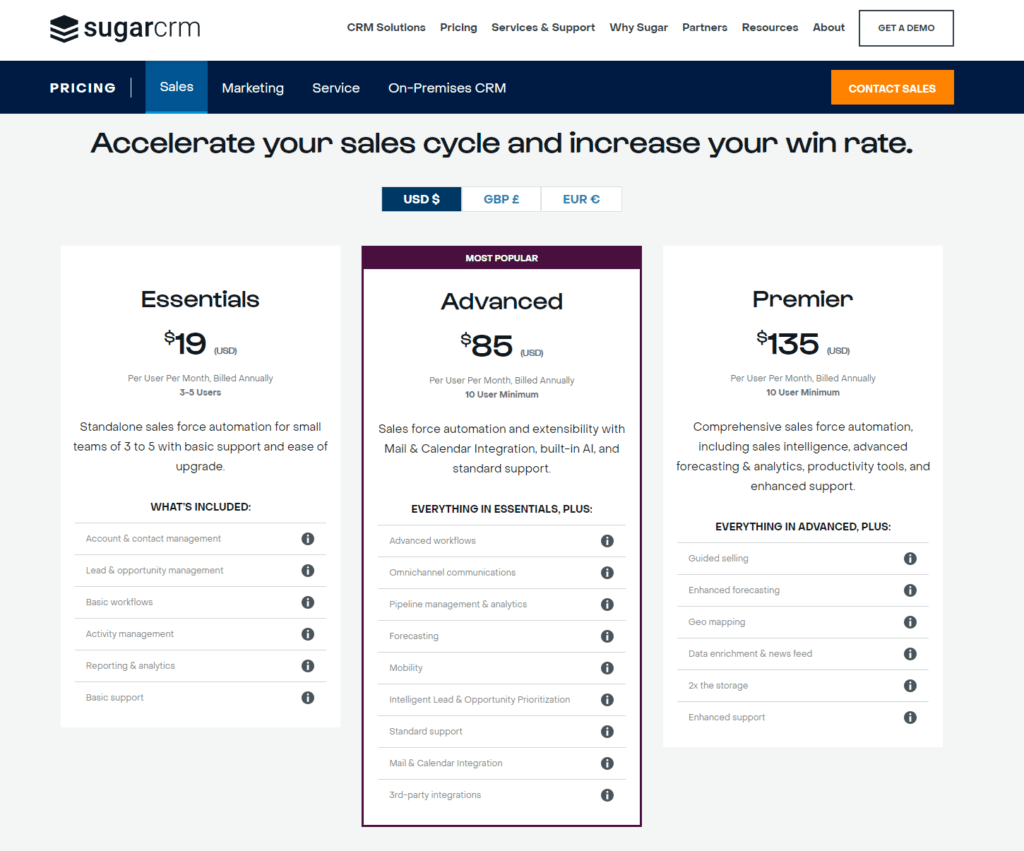In the bustling world of business, choosing the right CRM (Customer Relationship Management) tool can be as crucial as selecting the right partner for a dance. It’s about finding a solution that not only moves to the rhythm of your business but also enhances your performance on the floor of commerce. Today, we’re stepping into the arena with two notable contenders: HubSpot CRM and SugarCRM. Both platforms have their accolades and devotees, promising to streamline your sales processes, enhance customer relationships, and ultimately, drive your business forward. But which one will be the perfect dance partner for your business? Let’s take a closer look.
| HubSpot CRM | SugarCRM |
|---|---|
 |  |
| G2 Score -4.4 out of 5 | G2 Score -3.9 out of 5 |
| TrustRadius Score -8.5 out of 10 | TrustRadius Score -7.9 out of 10 |
Ease of Use
In the dance of business, time is a melody you can’t afford to miss a beat on. A CRM that’s complex and cumbersome can be like dancing in mismatched shoes – it just doesn’t flow. The ease of use of a CRM tool, therefore, becomes paramount for businesses aiming for smooth operations and seamless customer relationships.
HubSpot CRM: The Graceful Partner
HubSpot CRM is renowned for its user-friendly interface and intuitive navigation, making it an ideal partner for businesses of all sizes. It’s designed with simplicity in mind, ensuring that from the moment you step onto the platform, you’re guided with a clear path forward. Whether it’s managing contacts, tracking deals, or automating sales processes, HubSpot CRM makes it as straightforward as a well-rehearsed dance routine.
One of HubSpot CRM’s standout features is its onboarding process. New users are welcomed with guided tours, helpful prompts, and a plethora of resources, ensuring you’re never left stepping on toes. This ease of adoption is complemented by HubSpot’s commitment to providing a seamless experience, regardless of your tech savviness, making it a delightful partner in the fast-paced world of business.
SugarCRM: The Technical Virtuoso
SugarCRM, on the other hand, offers a platform with powerful capabilities and deep customization options, designed to cater to businesses with specific needs and complex processes. This depth, however, comes with a steeper learning curve, reminiscent of mastering a complex dance routine. While immensely powerful once fully leveraged, SugarCRM requires a more substantial investment in time and resources to get up to speed.
The platform’s strength lies in its flexibility and the level of control it offers over the CRM environment. For businesses with the capacity to dive deep into customization and who value a highly tailored CRM experience, SugarCRM can be a perfect match. However, for those looking for a solution that’s easy to pick up and dance with from day one, the technical prowess of SugarCRM might pose a challenge.
Pricing and Scalability
The investment in a CRM tool isn’t merely about the initial price tag; it’s about how well the tool can grow and adapt to your business needs over time. Scalability, coupled with a clear and manageable pricing structure, ensures that your CRM solution remains a valuable asset as your business evolves.
HubSpot CRM: A Scale to Fit Every Stage

HubSpot CRM begins its pricing appeal with an attractive proposition: a robust, free version that offers substantial value for small businesses or startups looking to get their feet wet with CRM functionality. This free tier includes essential features like contact management, email tracking, and deal pipelines, making it an excellent entry-level option for businesses of all sizes.
As your business grows and your needs become more sophisticated, HubSpot’s pricing model scales with you. The platform offers additional “Hubs” (Sales, Marketing, Service, and CMS) with tiered pricing (Starter, Professional, and Enterprise) that allows businesses to add more advanced features as needed. This modular approach to pricing provides flexibility, letting companies scale their CRM capabilities in line with their growth, without overcommitting resources upfront.
However, as you integrate more hubs and move to higher tiers, costs can accumulate, making it crucial for businesses to carefully consider which features are essential to their operations and which ones can wait.
SugarCRM: Tailored Solutions for Complex Needs

SugarCRM’s approach to pricing and scalability is tailored to meet the needs of mid-sized to large enterprises that require more complex CRM solutions from the get-go. Unlike HubSpot, SugarCRM doesn’t offer a free tier, but its pricing is structured to provide comprehensive CRM capabilities that cater to businesses with intricate sales processes, extensive customer service needs, and a demand for deep customization.
SugarCRM’s editions (Sugar Sell, Sugar Serve, Sugar Market, and more) are designed to provide a full suite of CRM tools that are highly customizable and scalable. This approach ensures that businesses can select the edition that best fits their immediate needs, with the option to scale up as their requirements evolve. While the entry cost may be higher than some competitors, the value lies in the depth of functionality and the ability to customize extensively.
Integration and Ecosystem Compatibility
In today’s interconnected digital landscape, a CRM doesn’t just need to manage customer relationships effectively; it also needs to seamlessly integrate with other tools and systems within your business ecosystem. This integration capability can greatly enhance operational efficiency and provide a more holistic view of customer interactions.
HubSpot CRM: The Center of a Connected Universe
HubSpot CRM stands out for its robust ecosystem and extensive integration capabilities. It’s designed to be at the heart of your business operations, seamlessly connecting with a wide array of tools and services. The HubSpot App Marketplace is a testament to this, featuring hundreds of integrations with popular business tools across email marketing, project management, customer service, accounting, and more. These integrations are not only about sharing data but also about creating cohesive workflows that enhance productivity and streamline processes.
Furthermore, HubSpot’s APIs offer flexibility for businesses looking to develop custom integrations, ensuring that even the most unique or specialized tools can become part of the HubSpot ecosystem. This comprehensive approach to integration makes HubSpot CRM an attractive option for businesses seeking a central platform that can unify various aspects of their operations.
SugarCRM: Custom Integration for Complex Needs
SugarCRM emphasizes its capability to offer deep, customizable integrations tailored to meet the specific needs of businesses with complex processes. While it might not boast the same breadth of ready-to-use integrations as HubSpot’s Marketplace, SugarCRM shines in its ability to create highly tailored connections between the CRM and other business tools. This is facilitated through its robust API and a focus on offering solutions that can be deeply integrated into a business’s existing technology stack.
SugarCRM’s approach to integration is particularly appealing to mid-sized and large enterprises that require precise control over how their CRM interacts with other systems. The platform’s commitment to customizable integration ensures that businesses are not just fitting their processes into the CRM, but rather tailoring the CRM to enhance and streamline their unique workflows.

Related: Check out our free SEO suite

Analytics and Reporting
The capability of a CRM to not only collect but also intelligently analyze and present data can significantly impact strategic decision-making, sales forecasting, and customer engagement strategies. Here’s how HubSpot CRM and SugarCRM perform in providing actionable insights through their analytics and reporting features.
HubSpot CRM: User-Friendly Insights for Strategic Growth
HubSpot CRM is designed to make analytics and reporting accessible to all users, regardless of their data analysis expertise. It offers a suite of built-in reporting features that cover a broad range of needs, from sales performance and productivity metrics to marketing campaign effectiveness and customer service efficiency. The platform provides customizable dashboard views and easy-to-understand visual reports, allowing businesses to quickly grasp their data and make informed decisions.
A key strength of HubSpot is its seamless integration across the entire HubSpot ecosystem, enabling comprehensive analytics that span across marketing, sales, and service activities. This holistic view ensures that businesses can track the customer journey end-to-end, identifying opportunities for optimization and growth. Additionally, HubSpot’s CRM includes predictive analytics features, helping businesses forecast trends and make proactive decisions.
SugarCRM: Advanced Analytics for Deep Business Insights
SugarCRM takes analytics and reporting to a more advanced level, offering powerful tools designed for businesses that require deep, detailed insights into their operations. SugarCRM’s reporting capabilities are highly customizable, allowing users to create complex reports that precisely match their informational needs. This includes sales trends, customer behavior patterns, and efficiency metrics across various business processes.
One of SugarCRM’s standout features is its advanced analytics platform, Sugar Discover, which provides automatic insights and AI-driven forecasting. This enables businesses to not only understand their current performance but also to anticipate future trends and outcomes. SugarCRM is focused on delivering actionable intelligence that can drive strategic business decisions, making it an excellent choice for enterprises with sophisticated data analysis needs.
Wrapping Up
After a thorough comparison of HubSpot CRM and SugarCRM across several critical aspects—ease of use, pricing and scalability, integration capabilities, and ecosystem compatibility—it’s clear that each CRM system offers unique advantages tailored to different business needs and priorities. HubSpot CRM shines as a highly intuitive, user-friendly platform ideal for small to medium-sized businesses and those just embarking on their CRM journey. Its strength lies in its extensive integration marketplace, robust free plan, and seamless connectivity across a broad ecosystem of tools, making it an excellent choice for businesses looking for an all-in-one solution to manage their sales, marketing, and customer service efforts. SugarCRM, on the other hand, caters to businesses with more complex needs, particularly mid-sized to large enterprises requiring deep customization and control over their CRM experience. Its emphasis on customizable integration and the ability to tailor the CRM to fit intricate business processes make it a powerful option for organizations that demand precision and flexibility from their CRM system.
Both HubSpot CRM and SugarCRM offer compelling benefits, but the best choice for your business will depend on aligning the CRM’s strengths with your operational needs and strategic objectives.
READ NEXT:
- The Role of Video Content in Financial Services SEO
- The Importance of GDPR Compliance in Email Marketing
- Impact Of GDPR On Marketers in EU and Outside
- Friends+Me vs SocialBakers: The Best Social Media Management Tool for You
- Gist vs BenchmarkONE: The Best Email Marketing Tool for You
- 9 Best Marketing CRM Software (For You): In 2023
- 19+ Top Customer Relationship Management (CRM) Software: What’s Best?





















